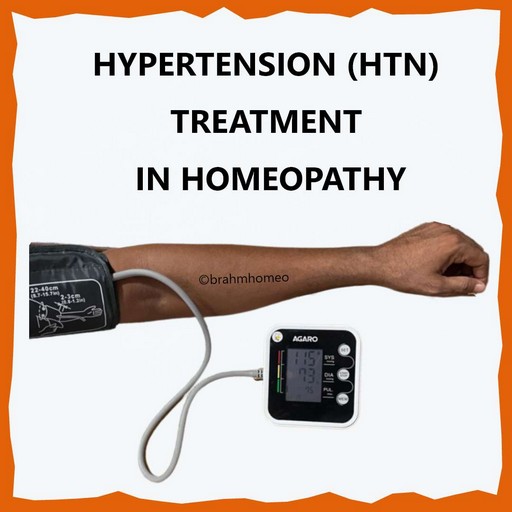
Hypertension (HTN) treatment in Homeopathy
High blood pressure (hypertension) is defined as high pressure (tension) in the arteries, which are the vessels that carry blood from the heart to the rest of the body.
High blood pressure increases the risk of heart disease and stroke. Hypertension risk factors include obesity, drinking too much alcohol, smoking, and family history.
- Blood pressure readings are given as two numbers:
- The systolic blood pressure (the top number) equals the pressure in the arteries as the heart contracts.
- The diastolic pressure (the bottom number) is the pressure in the arteries as the heart relaxes.
-
 Normal blood pressure is around 120/80 mm Hg. With the age also blood pressure increases.
Normal blood pressure is around 120/80 mm Hg. With the age also blood pressure increases. - Blood pressure between 120/80 and 130/90 is elevated blood pressure, and a blood pressure of 130/90 or above is considered high. Signs and symptoms of high blood pressure
High blood pressure may not have any symptoms and so hypertension has been labeled "the silent killer." Longstanding high blood pressure can lead to multiple complications including heart attack, kidney disease, or stroke.
Some people experience symptoms with their high blood pressure. These symptoms include:
Headache
Dizziness
Shortness of breath
Blurred vision
Feeling of pulsations in the neck or head
Nausea
Causes
There are two types of high blood pressure.
Primary (essential) hypertension
For most adults, there's no identifiable cause of high blood pressure. This type of high blood pressure, called primary (essential) hypertension, tends to develop gradually over many years.
Secondary hypertension
Some people have high blood pressure caused by an underlying condition. This type of high blood pressure, called secondary hypertension, tends to appear suddenly and cause higher blood pressure than does primary hypertension. Various conditions and medications can lead to secondary hypertension, including:
· Obstructive sleep apnea
· Kidney problems
· Adrenal gland tumors
· Thyroid problems
· Certain defects you're born with (congenital) in blood vessels
· Certain medications, such as birth control pills, cold remedies, decongestants, over-the counter pain relievers and some prescription
Risk factors
High blood pressure has many risk factors, including:
· Age. The risk of high blood pressure increases as you age
· Family history. High blood pressure tends to run in families.
· Being overweight or obese. The more you weigh the more blood you need to supply oxygen and nutrients to your tissues. As the volume of blood circulated through your blood vessels increases, so does the pressure on your artery walls.
· Not being physically active. People who are inactive tend to have higher heart rates. The higher your heart rate, the harder your heart must work with each contraction and the stronger the force on your arteries. Lack of physical activity also increases the risk of being overweight.
· Using tobacco. smoking or chewing tobacco raise your blood pressure.
· Too much salt (sodium) in your diet. Too much sodium in your diet can cause your body to retain fluid, which increases blood pressure.
· Too little potassium in your diet. Potassium helps balance the amount of sodium in your cells. If you don't get enough potassium in your diet or retain enough potassium, you may accumulate too much sodium in your blood.
· Drinking too much alcohol. Over time, heavy drinking can damage your heart.
· Stress. High levels of stress can lead to a temporary increase in blood pressure. If you try to relax by eating more, using tobacco or drinking alcohol, you may only increase problems with high blood pressure.
· Certain chronic conditions. Certain chronic conditions also may increase your risk of high blood pressure, such as kidney disease, diabetes and sleep apnea.
· Sometimes pregnancy contributes to high blood pressure, as well.
Diagnosis
To measure your blood pressure, doctor or a specialist will usually place an inflatable arm cuff around your arm and measure your blood pressure using a pressure-measuring gauge which will show elevated blood pressure.
Prognosis
It is curable with homeopathic treatment. Since how long you are suffering from disease, has to do a lot with treatment plan. No matter, since when are you suffering from your disease either from recent time or since many years -everything is curable with us but in early stage of disease, you will be cured faster. For chronic conditions or in later stage or in case of many years of suffering, it will take longer time to be cured. Intelligent person always start treatment as early as he /she observe any sign and symptom of this disease, so immediately contact us as soon as you observe any abnormality in you.
How we work on this disease
Brahm research based, clinically proved, scientific treatment module is very effective in curing this disease. We have a team of well qualified doctors who observe and analysis your case systematically, record all the signs and symptoms along with progress of disease, understand its stages of progression, prognosis and its complications. After that they clear you about your disease in details, provide you proper diet chart [what to eat or what not to eat], exercise plan, life style plan and guide you about many more factors that can improve your general health condition with systematic management of your disease with homeopathic medicines till it get cured.


















